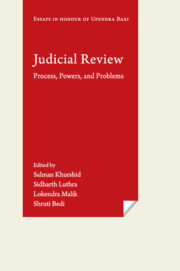Book contents
- Frontmatter
- Contents
- Foreword
- Editors' Note
- Introduction
- 1 The Inadequacy of Judicial Enforcement of Constitutional Rights Provisions to Rectify Economic Inequality, and the Inevitability of the Attempt
- 2 The Interplay of Law and Politics in India
- 3 Beating the Backlog: Reforms in Administration of Justice in India
- 4 Judicial Review: Perspectives and Reflections for the Twenty-First Century
- 5 When ‘Creeping Jurisdiction’ Goes Awry: The Social Action Litigation to Ban Surrogacy
- 6 Judicial Review and the Democratic Judge
- 7 Judicial Review: A Tool to Shape Constitutional Jurisprudence
- 8 The Baxian Bioscope on Indian Judicial Process
- 9 Judicial Activism, Courts, and Constitutional Revolutions: The Israeli Case
- 10 Democracy, Constitution, and Judicial Review: A Critique
- 11 A Minor Jurisprudence of Pathos: Upendra Baxi as Teacher and Writer
- 12 The Need for Reinventing the Supreme Court as a Constitutional Court
- 13 Appointment of ‘Distinguished Jurists’ as Judges in the Supreme Court of India: A Critical Analysis
- 14 Judicial Dissent and Judicial Review: A Functional Analysis
- 15 The Power of Judicial Review: Judicial Chutzpah or Judicial Desideratum
- 16 Judicial Review of Legislations by Tribunals in India: Law, Problems, and Perspectives
- 17 Criminalization of Membership of Terrorist Organizations in India and the United States of America: Human Rights Concerns
- 18 Article 142 of the Indian Constitution: On the Thin Line between Judicial Activism and Restraint
- 19 Sketching the Limits of Article 142 of the Constitution of India: A Constitutional Necessity
- 20 Constitutional Morality and Judges of the Supreme Court
- About the Contributors
- Index
20 - Constitutional Morality and Judges of the Supreme Court
Published online by Cambridge University Press: 23 January 2020
- Frontmatter
- Contents
- Foreword
- Editors' Note
- Introduction
- 1 The Inadequacy of Judicial Enforcement of Constitutional Rights Provisions to Rectify Economic Inequality, and the Inevitability of the Attempt
- 2 The Interplay of Law and Politics in India
- 3 Beating the Backlog: Reforms in Administration of Justice in India
- 4 Judicial Review: Perspectives and Reflections for the Twenty-First Century
- 5 When ‘Creeping Jurisdiction’ Goes Awry: The Social Action Litigation to Ban Surrogacy
- 6 Judicial Review and the Democratic Judge
- 7 Judicial Review: A Tool to Shape Constitutional Jurisprudence
- 8 The Baxian Bioscope on Indian Judicial Process
- 9 Judicial Activism, Courts, and Constitutional Revolutions: The Israeli Case
- 10 Democracy, Constitution, and Judicial Review: A Critique
- 11 A Minor Jurisprudence of Pathos: Upendra Baxi as Teacher and Writer
- 12 The Need for Reinventing the Supreme Court as a Constitutional Court
- 13 Appointment of ‘Distinguished Jurists’ as Judges in the Supreme Court of India: A Critical Analysis
- 14 Judicial Dissent and Judicial Review: A Functional Analysis
- 15 The Power of Judicial Review: Judicial Chutzpah or Judicial Desideratum
- 16 Judicial Review of Legislations by Tribunals in India: Law, Problems, and Perspectives
- 17 Criminalization of Membership of Terrorist Organizations in India and the United States of America: Human Rights Concerns
- 18 Article 142 of the Indian Constitution: On the Thin Line between Judicial Activism and Restraint
- 19 Sketching the Limits of Article 142 of the Constitution of India: A Constitutional Necessity
- 20 Constitutional Morality and Judges of the Supreme Court
- About the Contributors
- Index
Summary
The Constitution of India, like most corresponding basic documents of governance in other countries, as indeed the unique unwritten Constitution of United Kingdom, holds the key to our collective understanding of how we, as a people, have agreed to conduct the affairs of our nation. In another sense it reflects the fundamental tests of right and wrong in our public and personal conduct in society. In a similar manner, an unwritten moral code of conduct applies a test of standards to our social behaviour. Yet we are told that law and morality must indeed be kept apart in modern social systems, although there is considerable overlap and mutual influence between the two. But what the constitutional code means and how it is to be applied in diverse, often unexpected or unpredictable, situations is an important dimension of the binding principles of the code. In the common law world, this decision is left to the wisdom of judges with the theoretical restriction imposed by parliamentary supremacy in the British system, and some continuing debates in other jurisdictions that also subscribe to the separation of powers. The mind of a judge, therefore, is critical for our understanding of law and the role assigned to, or perhaps assumed by, judges in having the last word. This was felicitously declared by a chief justice of the Supreme Court of India to be ‘Supreme but not infallible’. In arriving at that final view of law, how does a judge deal with the hard case, which does not have an easy answer according to the normal rules of judicial decision-making? The answer lies in theories of adjudication as applied to our experience.
In studying judicial behaviour, the materials most readily available are the judgments of courts, but it is only seldom that they discuss judicial attitudes and methods of decision-making. Periodically, significant insights are made available in extra-judicial lectures and a few biographies, so much insight comes ‘after the fact’. The concept of functus officio is familiar to judicial decision-making. But one wonders what to make of judges, after they laying down office, publicly reflecting upon the judgments they pronounced during their tenure on the bench. This is particularly challenging if the reflection is in the nature of doubt or an admission of a mistake.
- Type
- Chapter
- Information
- Judicial Review , pp. 384 - 410Publisher: Cambridge University PressPrint publication year: 2020



